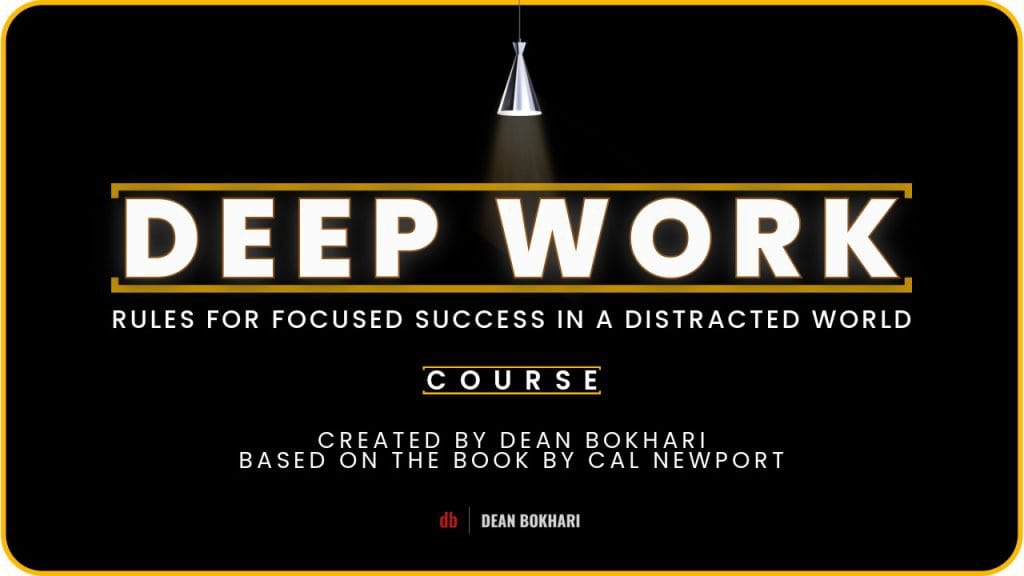Quick Tips for Successful Deep Work Sessions
🎧 PRESS PLAY TO LISTEN
📖 LESSON SUMMARY
Quick tips to keep in mind for successful deep work sessions:
- Your deep work capacity is finite. As tempting as it is to push yourself and go as deep as possible, there’s a limit to how long we can maintain our focus… And when it comes to deep work, that limit is about four hours per day. Beyond that, our ability to sustain our focus begins to decline. Keep that in mind as you schedule your deep work sessions.
- When you rest, rest. Have you ever hit a roadblock at work that you just couldn’t figure your way around, only to come back the next day knowing exactly what to do about it? Sometimes, your mind just needs a good night’s rest. Next time you’re experiencing difficulty working through a complex challenge, give your mental batteries an opportunity to recharge.
- Apply the pomodoro technique to deep work. If you tend to procrastinate, try this:
- Set a timer for 25 minutes, and spend that time focusing on ONE single task that you’ve decided on ahead of time. This 25-minute chunk is called a pomodoro.
- Once the timer rings, take a 5-minute break to relax, drink a glass of water, stretch, stand or move around a little.
- When your break is over, get back to deep work.
- Impose time limits on yourself. If you think it’ll take 2 hours to finish putting together a PowerPoint presentation, give yourself 1. If you think it’ll take three hours to write an article, give yourself 1.5. Knowing you’ve got a time limit to do something helps you harness all your focus and direct it toward the one thing you’re working on—thus, making you more productive. Of course, this one doesn’t apply to everything, but it’s a handy tip to keep in your back pocket whenever necessary. Think of it as high intensity interval training for the attention centers of your brain.
- Spend 20 minutes a day reading. And don’t get up or check your phone while you do it. Just set a timer, open an interesting book, and start reading. This habit will not only expand your knowledge, but it’ll also train your mind to stay focused when you start working.
- Have a master list to work from. If you don’t already have a master list of all your goals, start one. Have a single “master list” where you can write down everything you want to accomplish, personally and professionally.
- Break down your master list. Once you’ve created a master list, pick a list of goals you plan to accomplish this year. Then, break that down into a monthly list. And finally, break it down into a weekly list. Now, you can organize your daily deep work based on what you want to accomplish this week, this month, and this year. This will make it easier for you to lock-in and get focused.
- Quantify the depth of your activities. To focus on deep work and decrease the amount of time you spend on shallow work, it’s helpful to distinguish the difference between the two so that you can direct your efforts toward your highest priorities on a daily basis. A great way to do that is to assign a “deep” or “shallow” grade to the work you plan to do each day.
- Examples of shallow work are: emails, slack, social media, logistical tasks, non-essential meetings.
- Examples of deep work are: prepping for presentations, programming, writing, researching solutions to specific problems, etc.
- Here’s how to determine if a task is considered “deep” or not: If you can easily answer “yes” to most of the following questions, you can safely put it in the “deep work” category:
- Does this task require focused attention?
- Does this task require specialized training or knowledge?
- Does this task create new value in the world?
- Would this task be difficult to replicate?
- Keep a “later list.” I don’t know about you, but I tend to get the best ideas at the most random times. Sometimes these ideas can become a distraction—impeding my ability to go deep. That’s why having a simple “later list” is so helpful: any time you’re in a deep work session and an idea/thought pops into your mind that you might want to explore, avoid the urge to follow it in the moment… Instead, jot it down on your “later list” and come back to it after you’re finished with your deep work session.
- Minimize interruptions while you work. It takes about 20 minutes to recover from an interruption. You can’t afford too many of those in a workday. So, proactively protect yourself from interruptions that derail you from your deep work: let coworkers/family members know you can’t be interrupted between the hours of X:00am – X:00am unless it’s an absolute emergency. Hang a sign on the door, letting potential interruptors know you’re focused on deep work and cannot be innterrupted until you’re done. Silence your phone or put it on DND.

